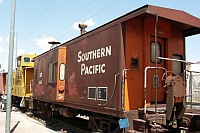SOUTHERN PACIFIC RAILROAD
Caboose No. 4603

|
SOUTHERN PACIFIC RAILROAD Caboose No. 4603 |
|
| Listen Here |
This caboose′s
bay windows made it easy for the rear-end crew to monitor the operation of a
freight train.
It was built by the International Car Division of PACCAR for the Southern
Pacific Railroad in April 1978. Bay window cabooses began being built when
freight cars were becoming taller, making it difficult to see the rest of the
train from a top-mounted cupola. It has a conductor′s desk, crew seating, bunks,
stove, and a toilet, and carried equipment and spare parts.
It was used in mainline service out of Tucson until 1994, then in local service
out of Phoenix until its retirement in 1996, at which time it was donated to the
museum.
While in local service from the Southern Pacific yard in Phoenix, this car
served on the Buckeye local, then spent its final days on the Magma Turn, the
train that served Chandler.
Builder PACCAR (the former Pacific Car & Foundry Company) took over long-time
caboose maker International Car Company of Kenton, Ohio, in 1975, and built this
caboose as one of 50 in class C-50-7. In Southern Pacific nomenclature, C is for
caboose, 50 for axle load in tons, and it was the 7th design of its class.
Cabooses usually carried a conductor, one or more brakemen, and in earlier days
a flagman. Cabooses were replaced by end-of-train devices in the 1980s. These
monitored the braking system and the integrity of the train using advanced
technology. The conductor and brakeman could then ride at the front of the
train. And flagmen were no longer needed to protect the rear of the train when
it stopped, because of modern signaling systems.
The Southern Pacific Railroad moved the caboose to the museum′s Armstrong Park
location on Erie Street in 1996. The Union Pacific then moved it south to the
museum′s new Tumbleweed Park location on Ryan Road, along with the rest of the
fleet, in 2006. (The Union Pacific took over the Southern Pacific in September
1996.)
 |
5/23/2003 - Photo of SP caboose at old museum location. |